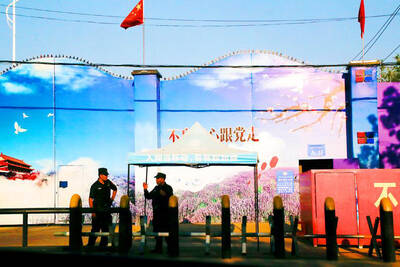More than half of Taiwanese say they do not believe in the credibility of the judiciary, a survey released yesterday by the Chinese Nationalist Party (KMT)-affiliated National Policy Foundation showed.
The survey found that 52.5 percent of respondents did not trust the credibility of the judicial system, compared with 34.2 percent who did.
It found that 57.6 percent did not believe that judges would try cases fairly, while 31.8 percent said they believed that they would.
Asked if they believed that “the Council of Grand Justices has not been subjected to improper interference, and interpret the Constitution objectively and fairly,” 52.6 percent said that they did not, while 29.7 percent said that they did, the foundation said.
Asked whether they understood President Tsai Ing-wen’s (蔡英文) ideas and proposals on judicial reform, 83.8 percent said that they did not and 12.8 percent said that they did, the survey showed.
Asked whether they had confidence in the effectiveness of Tsai’s efforts to promote judicial reform, 46.8 percent said that they did not, while 43 percent said that they did, it showed.
The public’s lack of understanding of the president’s ideas and proposals for judicial reform should serve as a “major warning,” Chinese Culture University law professor Wu Yen-te (吳盈德) said at a news conference in Taipei.
Given that nearly half of the respondents in the survey were not confident in the reform of the judicial system, it appears that Tsai needs to work harder, he said.
Improving public confidence in the credibility of the judiciary should be seen as as a major task for the remainder of Tsai’s term in office, he added.
When Tsai was sworn in as president in 2016, she vowed to promote judicial reform and later held a national conference on judicial reform, with an aim of winning back public confidence in the judiciary, foundation internal and legal affairs committee convenor Huang Te-fu (黃德福) said.
However, surveys over the past five years have presented an “opposite” result, Huang said.
Judicial reform has “evaporated” during Tsai’s presidency, he said, urging the government to step up its reform efforts.
Instead of adopting a system in which the public participates in trials, it is more important to increase the number of judicial personnel, as having too many cases to handle could affect the quality of judgements, attorney Wang Han-hsing (王瀚興) said.
The survey was commissioned by the foundation and conducted by Taiwan Real Survey Co from April 20 to April 22. It was based on telephone interviews with 1,075 adults aged 20 or older, and had a confidence level of 95 percent and a margin of error of 2.99 percentage points, the foundation said.

Former Czech Republic-based Taiwanese researcher Cheng Yu-chin (鄭宇欽) has been sentenced to seven years in prison on espionage-related charges, China’s Ministry of State Security announced yesterday. China said Cheng was a spy for Taiwan who “masqueraded as a professor” and that he was previously an assistant to former Cabinet secretary-general Cho Jung-tai (卓榮泰). President-elect William Lai (賴清德) on Wednesday last week announced Cho would be his premier when Lai is inaugurated next month. Today is China’s “National Security Education Day.” The Chinese ministry yesterday released a video online showing arrests over the past 10 years of people alleged to be

THE HAWAII FACTOR: While a 1965 opinion said an attack on Hawaii would not trigger Article 5, the text of the treaty suggests the state is covered, the report says NATO could be drawn into a conflict in the Taiwan Strait if Chinese forces attacked the US mainland or Hawaii, a NATO Defense College report published on Monday says. The report, written by James Lee, an assistant research fellow at Academia Sinica’s Institute of European and American Studies, states that under certain conditions a Taiwan contingency could trigger Article 5 of NATO, under which an attack against any member of the alliance is considered an attack against all members, necessitating a response. Article 6 of the North Atlantic Treaty specifies that an armed attack in the territory of any member in Europe,

LIKE FAMILY: People now treat dogs and cats as family members. They receive the same medical treatments and tests as humans do, a veterinary association official said The number of pet dogs and cats in Taiwan has officially outnumbered the number of human newborns last year, data from the Ministry of Agriculture’s pet registration information system showed. As of last year, Taiwan had 94,544 registered pet dogs and 137,652 pet cats, the data showed. By contrast, 135,571 babies were born last year. Demand for medical care for pet animals has also risen. As of Feb. 29, there were 5,773 veterinarians in Taiwan, 3,993 of whom were for pet animals, statistics from the Animal and Plant Health Inspection Agency showed. In 2022, the nation had 3,077 pediatricians. As of last

XINJIANG: Officials are conducting a report into amending an existing law or to enact a special law to prohibit goods using forced labor Taiwan is mulling an amendment prohibiting the importation of goods using forced labor, similar to the Uyghur Forced Labor Prevention Act (UFLPA) passed by the US Congress in 2021 that imposed limits on goods produced using forced labor in China’s Xinjiang region. A government official who wished to remain anonymous said yesterday that as the US customs law explicitly prohibits the importation of goods made using forced labor, in 2021 it passed the specialized UFLPA to limit the importation of cotton and other goods from China’s Xinjiang Uyghur region. Taiwan does not have the legal basis to prohibit the importation of goods